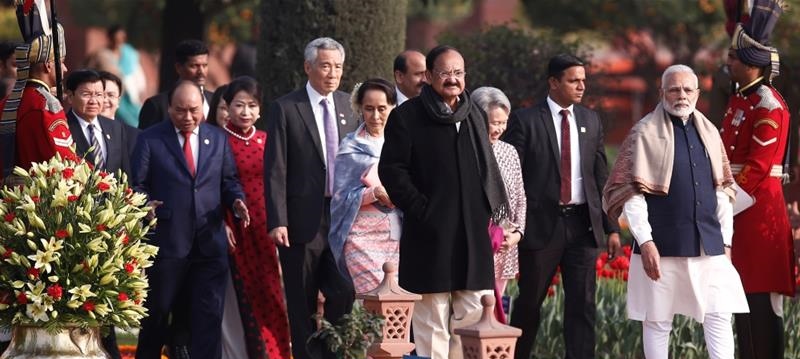India’s engagement with ASEAN nations
January 30, 2018 | Expert Insights

As part of India “Act East” policy, India rolled out a red-carpet welcome to leaders from the Association of Southeast Asian Nations (ASEAN) to mark 25 years of New Delhi's ties with the ASEAN bloc.
Background
All 10 heads of states from ASEAN (comprising of Singapore, Cambodia, Vietnam, Indonesia, Malaysia, Thailand, Myanmar, Philippines, Laos and Brunei) were invited as chief guests at India's 69th Republic Day celebrations, a move dubbed as "unprecedented" by diplomats and analysts.
The ASEAN leaders witnessing the grand parade at Rajpath - the main avenue in the heart of New Delhi - was an event high on symbolism.
Even though India is not a member of ASEAN, the India-ASEAN relationship during a 2012 meeting was elevated to a “strategic” partnership. In order to mark the 20th anniversary of ASEAN, the India-ASEAN summit was held in Delhi in December 2012. This also commemorated the 10 years of summit level partnership that India shared with ASEAN. The commemorative summit was attended by the Heads of States of the 10 ASEAN countries and then Indian Prime Minister Dr. Manmohan Singh
The Look East policy
India's Look East policy is an effort to cultivate extensive economic and strategic relations with the nations of Southeast Asia in order to bolster its standing as a regional power and a counterweight to the strategic influence of the People's Republic of China.
In 1991, India adopted its "Look East" policy as part of a focus to strengthen trade and strategic relations with Southeast Asian nations. But progress has been slow. India's trade with ASEAN has grown from $2.9bn in 1993 to $71bn in the last year, compared with China-ASEAN trade at $450bn. Beijing aims to take the trade to $1 trillion by 2020.
After coming to power in 2014, Modi rechristened the "Look East" policy to "Act East", with commerce, connectivity and culture as the guiding themes to boost engagement with the bloc.
Analysis
A consultant at The Takshashila Institution, a Bangalore-based think-tank, Manoj Kewalraman said the Republic Day invitation was a "very positive move".
"It's unprecedented that all the 10 ASEAN leaders were invited. It's an indicator that India is looking at deeper engagement with the ASEAN leaders," he said.
Speaking at the ASEAN-India gathering, with the theme "Shared Values, Common Destiny", Indian Prime Minister Narendra Modi focused on the need to boost maritime collaboration. "India shares the ASEAN vision for rule-based societies and values of peace. We are committed to working with ASEAN nations to enhance collaboration in the maritime domain," Modi said.
India's emphasis on maritime ties is significant as China and some ASEAN nations have clashed over the issue of the South China Sea. India has forged closer military and business ties with some ASEAN members, including Vietnam, which has been at loggerheads with Beijing over the South China Sea.
"The presence of the 10 ASEAN leaders at the Republic Day function in New Delhi reiterates India's commitment to strengthen the cultural, social and religious bonding and expand economic engagement, besides regaining the much-deserved strategic space in the region," said Sheshadri Chari, a member of the National Executive of the ruling Bharatiya Janata Party (BJP).
This event is being regarded as a key moment for India’s Prime Minister Narendra Modi. It is not only an opportunity for him to host a high-level event, but it will also be a moment to action one of the most important agenda’s he has set forth for India. In part, this is about converting India’s “Look East” policy into India’s “Act East” policy.
"There is a lot of trade that can happen. What India needs to do in this context is the first step towards this, to establish connectivity, more flights, more networks, more business-to-business ties," Kewalramani from The Takshashila Institution said.
The Indian government has also spoken about this. "The Prime Minister's intention that the 'Look East' policy should now be the 'Act East' policy is really taking shape," said Defence Minister Nirmala Sitharaman. "And, by the very presence of 10 leaders from ASEAN during the Republic Day celebrations, India will definitely showcase its 'Act East' policy," Sitharaman added.
Many commentators have suggested India's ASEAN outreach is a counter to China, which has deepened its engagement in the Indian Ocean, establishing closer ties with Pakistan, Maldives, Sri Lanka, Bangladesh and Myanmar.
However Kewalramani, who researches Chinese foreign policy, says New Delhi's engagement with ASEAN should not be seen as a counterbalance to China. "Yes, there is an element of competing with China, but I don't think that's a predominant element," he said. China's foreign affairs ministry said it was open to "normal cooperation between Indian and ASEAN countries". But it was critical of the Indian media, a section of which projected India's move as a challenge to China.
Assessment
As we had stated earlier India stands to benefit massively from an actionable ‘Act East’ policy. If the country is serious about becoming a formidable economic power, then it has to develop its ties with its own neighbours. We believe that there are long-term strategic goals, India needs to move beyond its neighbourhood and should engage with the ASEAN region.








Comments